
In this update:
- State of the State Address
- Legislative Updates
- Redistricting Updates
- Election Updates
State of the State Address
On Tuesday, January 23, 2024 at 7 PM, Gov. Tony Evers (D) will deliver his 2024 State of the State Address.
Watch the speech here: https://wiseye.org/?p=29281
Legislative Updates
Senate rejects appointment of Huebner to PSC
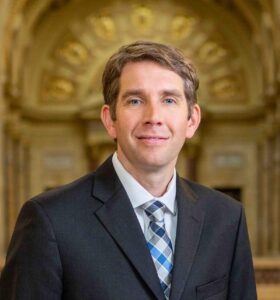 The Republican-controlled state Senate rejected (21-11) Tyler Huebner’s nomination to the Public Service Commission (PSC), making it the tenth executive branch appointment Republicans have not confirmed since Governor Tony Evers (D) took office five years ago. Sen. Van Wanggaard (R), a member of the Senate Utilities and Technology Committee, released a statement on his vote to reject Mr. Huebner’s nomination stating that he believed Mr. Huebner did not follow the law. “At least twice, he [Huebner] decided to ignore the law as Commissioner. He illegally authorized utility rates based on income, instead of usage, as required by law. He authorized a third-party solar arrangement in Stevens Point, despite a bill authorizing third-party solar arrangements being introduced and failing in the Legislature six or eight years in a row. Despite promising to recuse himself from decisions on which he had lobbied, he has not.” Sen. Rob Cowles (R) was the sole Republican vote in favor of Huebner’s confirmation.
The Republican-controlled state Senate rejected (21-11) Tyler Huebner’s nomination to the Public Service Commission (PSC), making it the tenth executive branch appointment Republicans have not confirmed since Governor Tony Evers (D) took office five years ago. Sen. Van Wanggaard (R), a member of the Senate Utilities and Technology Committee, released a statement on his vote to reject Mr. Huebner’s nomination stating that he believed Mr. Huebner did not follow the law. “At least twice, he [Huebner] decided to ignore the law as Commissioner. He illegally authorized utility rates based on income, instead of usage, as required by law. He authorized a third-party solar arrangement in Stevens Point, despite a bill authorizing third-party solar arrangements being introduced and failing in the Legislature six or eight years in a row. Despite promising to recuse himself from decisions on which he had lobbied, he has not.” Sen. Rob Cowles (R) was the sole Republican vote in favor of Huebner’s confirmation.
Gov. Evers was critical of Republicans for rejecting another one of his appointees. “Republicans’ ongoing efforts to harass, disparage, and fire dedicated public servants is a serious threat to the basic functions of our government and democracy in our state,” Gov. Evers said in a press release. “Wisconsinites are sick of Republicans’ nonsense, and I don’t blame them.”
The Senate confirmed (27-5) Summer Strand’s appointment to the PSC; Sen. Cowles, Sen. Tim Carpenter (D), Sen. Chris Larson (D), Sen. Duey Stroebel (R), and Sen. Cory Tomczyk (R) voted in opposition. Gov. Evers appointed Strand as chair of the PSC last week, succeeding current Chairperson Rebecca Cameron Valcq who will be leaving state service effective February 2nd, 2024.
Gov. Evers appointed Kristy Nieto as a PSC commissioner. Nieto is currently a division administrator for energy regulation and analysis at the PSC. With the rejection of Commissioner Huebner’s appointment, Governor Evers still has one vacant appointment to fill at the commission.
Senate and Assembly Floor Session Recap
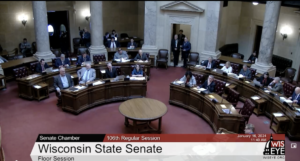
The Senate and Assembly were in session this week on Tuesday and Thursday. Below are some of the highlights for this week’s floor sessions:
- The Senate voted along party lines in favor of a $3 billion GOP plan to reduce the third-highest tax bracket and expand a retirement income break. Sen. Rachael Cabral-Guevara (R) said the break would allow Wisconsinites to keep their money while prices are climbing. “If you happen to be a no vote, what you’re in essence saying is: ‘Give us your money down here in Madison. We know how to spend your damn money better than you,’” she said. “I think that’s wrong.” No Democratic Senators spoke on the bill during the floor debate. AB 386 would reduce the third-highest tax bracket from 5.3% to 4.4% and would enable married couples to subtract $150,000 in payments from qualified retirement plans from their taxable income if they’re 67 and older. The bill now heads to Governor Evers (D) desk where he has already vowed to veto.
- The Senate passed another pair of bills that would allow the state access to $78 million in federal grants for new electrical vehicle charging stations. SB 792 would direct the Department of Transportation to create a program to provide funding for electric vehicle infrastructure projects. SB 791 would allow private businesses to sell electricity via EV charging stations by the kilowatt-hour (kWh), instead of by the hour, without being regulated as utilities. The bill also includes a 3 cents per kWh excise tax. Both passed 30-2 with Sens. Rob Cowles (R) and Duey Stroebel (R) not voting in favor.
- The Assembly approved via voice vote a series of licensing bills. AB 143 would prohibit DSPS and credentialing boards from requiring applicants to pass a statutes and rules exam to receive a license or certification for certain professions. AB 90 would require DSPS to contract with a third party to receive license applications and issue licenses for occupational therapists or occupational therapy assistants.
- The Senate and Assembly voted in favor of bills to increase dental access. AB 666 would enter Wisconsin into the Dentist and Dental Hygienist Compact, increasing license portability between compact states. AB 667 would allow the Joint Finance Committee to fund the supplemental appropriation for tech college programs to boost the state’s oral health care workforce up to $20 million in the 2023-25 biennium. AB 668 would allow for the licensure of dental therapists by the Dentistry Examining Board. These bills now head to Governor Evers’ desk.
Vos not interested in amending cannabis bill
Republican Assembly Speaker Robin Vos said he is not interested in amending the proposed plan to legalize medical marijuana in Wisconsin. Senate Republicans voiced concerns about “growing the size of government” by having state-run dispensaries instead of having the private sector fulfill that role. The Assembly Republican proposal would create five state-run dispensaries. Speaker Vos said he has 50 votes to pass the legislation as it has been introduced in his caucus and any amendments could cost him support in the Assembly. “I’d rather get us through to keep the promises we made, which is to have a comprehensive bill that can actually become law, as opposed to an ethereal idea that maybe somebody could support someday, but it never actually makes it anywhere,” Speaker Vos said. Senate Majority Leader Devin LeMahieu (R) said he was open to making changes to the bill for it to pass in the Senate.
Redistricting Updates
Analysis of proposed maps
Each party involved in the state’s redistricting case had until 5:00 PM on January 12th to submit remedial maps. Each party now has until 5:00 PM on January 22nd to file a response brief in support or opposition to any remedial map that was filed.
In the interim, Marquette University Law School research fellow John Johnson and conservative online media outlet Wisconsin Right Now have shared their analyses of the submitted maps. (see below)
Remaining steps in the Wisconsin Supreme Court’s redistricting process:
- January 22nd: Responses in support or opposition to proposed remedial maps due.
- February 1st: Report from the court consultants evaluate the maps on the court’s requirements
- February 8th: Responses from parties involved in the cases to the consultants’ report
- March (TBD): Court releases final legislative maps for 2024 election
Marquette University Law School Analysis
Marquette University Law School research fellow John Johnson created interactive maps of the proposed redistricting maps submitted to the Wisconsin Supreme Court. Mr. Johnson also created a scorecard that breaks down factors like partisan balance, compactness, and the number of municipalities, counties and wards split on each map. He found that if the proposed maps had been in place during the 2022 election, the Democratic candidates would have won more Assembly seats with six of the proposed maps. In the Senate, two of the maps would have created a Democratic party majority in 2022.
Download an 80 MB HTML file with interactive maps.
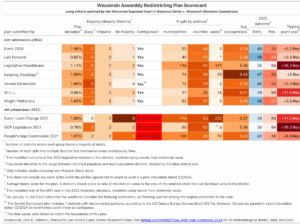
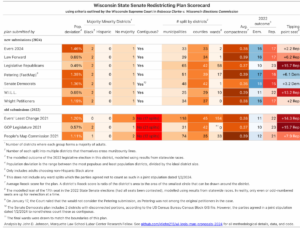
Wisconsin Right Now Analysis
Wisconsin Right Now analyzed the maps that Governor Tony Evers submitted to the Supreme Court and found that the governor paired dozens of Republican incumbents against each other. Gov. Evers’ incumbent pairings would put 35 Republican lawmakers at risk of losing their seat. The map only had one Democratic lawmaker against another Democratic lawmaker.
Here are some of the pairings:
- Shae Sortwell (R) vs. Rep. John Macco (R)
- Assembly Majority Leader Tyler August (R) vs. Rep. Amanda Nedweski (R)
- Duey Stroebel (R) vs. Sen. Dan Knodl (R)
- Julian Bradley (R) vs. Sen. Van Wanggaard (R)
Under Wisconsin Right Now’s analysis, 8 of the 10 Democratic-leaning maps submitted to the Wisconsin Supreme Court would flip to Democratic control using a composite of election data from 2016 to 2022. Using only the 2022 governor’s race data, 10 of the 10 Democratic-leaning maps would flip the control.
Reactions to the maps:
Assembly Speaker Robin Vos (R) said he is waiting to see if the Wisconsin Supreme Court chooses the Republican maps or if their consultants will develop something favorable before filing an appeal to the U.S. Supreme Court. “Our goal is to not rush to the U.S. Supreme Court,” Speaker Vos said. He criticized the Democratic map proposals, calling them “a political gerrymander.” He said, “I think the same map also disenfranchises almost 10% of the state’s population where they don’t have a right to actually vote for a state senator in 2024 like they had planned on doing.”
Democratic voters ask SCOWIS to redraw WI congressional districts
Washington D.C. based Elias Law firm filed a brief with three Democratic voters asking the state Supreme Court to redraw the congressional districts in Wisconsin before the 2024 elections, based off the court’s ruling last month over the state’s legislative lines. The three voters were part of the court’s 2021 redistricting lawsuit, and the current suit looks to submit new congressional lines that align with the state legislative maps ruling. The petition argues some of the lines in place are from the court’s 2021 decision to take a “least change approach” to the maps that were drawn by Republicans a decade before. With that standard removed from the state legislative maps, the brief argues there is no justification to maintain the current congressional lines based on the same principle. The map would otherwise remain in effect until at least 2031 and be in place for at least another four elections. “It is lawless in justification, partisan in effect, and backwards under Wisconsin’s constitutional order,” the brief argues.
Wisconsin GOP Chair Brian Schimming vowed to appeal to the U.S. Supreme court if the state justices find the lines unconstitutional. “The newly bought and paid for liberal majority on the Wisconsin Supreme Court faces yet another test of the public’s trust: do the right thing by leaving the current, constitutional maps in place, or once again abandon sound judgment by catering to their left-wing out-of-state donors,” he said. U.S. Rep. Mark Pocan (D) said he supports the lawsuit. “Wisconsin is a purple state; however, our current congressional district maps do not reflect that,” Rep. Pocan posted on X.
Election Updates
VP Harris coming to Wisconsin on Monday
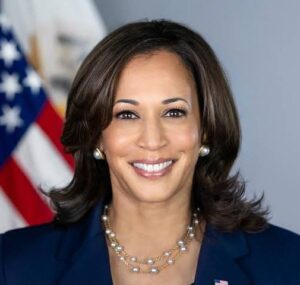 President Joe Biden’s campaign announced Vice President Kamala Harris will be visiting Waukesha County on Monday to highlight the anniversary of Roe v. Wade. The U.S. Supreme Court overturned the case in 2022. Vice President Harris’s visit to Wisconsin will be an official White House event and will “spotlight the all-out assault on women’s reproductive rights since the fall of Roe.” The campaign also announced a new paid media campaign to target women and swing voters in battleground states that focuses on the personal impact of abortion bans.
President Joe Biden’s campaign announced Vice President Kamala Harris will be visiting Waukesha County on Monday to highlight the anniversary of Roe v. Wade. The U.S. Supreme Court overturned the case in 2022. Vice President Harris’s visit to Wisconsin will be an official White House event and will “spotlight the all-out assault on women’s reproductive rights since the fall of Roe.” The campaign also announced a new paid media campaign to target women and swing voters in battleground states that focuses on the personal impact of abortion bans.
DPW raised more funds than RPW in the second half of 2023
The Democratic Party of Wisconsin (DPW) outraised the Republican Party of Wisconsin (RPW) more than 2-to-1 during the last half of 2023. However, RPW has a 5-to-1 advantage for cash on hand. The Democratic Party raised $2.1 million during the last six months of 2023 and spent almost $2 million. At the end of the year, the party had $186,903 left in the bank. DPW listed five donors gave them six-figure contributions: Kenneth Duda, of Menlo Park, CA., $250,000; Deborah Kern, of Fox Point, WI, $120,000; Illinois Gov. J.B. Pritzker, $100,000; William Harris, of Miami Beach, FL, $100,000; and William Harris, of Lexington, MA, $100,000. They also received $50,000 in November from former U.S. Sen. Herb Kohl and $25,000 each from director Steven Spielberg and actress Kate Capshaw. The largest expenses were almost $1.7 million in transfers to its federal account and $159,505 to local party affiliates.
The Republican Party reported $899,290 in receipts, $350,355 in expenses, and more than $1 million cash on hand. A large portion of Wisconsin’s GOP party fundraising came from Beloit billionaire and GOP megadonor Diane Hendricks’s $745,000 donation and a $50,000 donation from Lynn Kieffer from Princeton, WI. RPW transferred $168,024 to their federal account.
Read DPW’s report.
Read RPW’s report.



